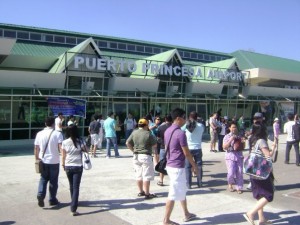PH gov’t, Korean bank sign loan deal for upgrade of Puerto Princesa airport

Disembarking passengers troop to the arrival area of the Puerto Princes airport in this file photo. The airport will undergo an upgrade following a loan agreement for $71.6 million between the Department of Finance and the Export-Import Bank of Korea. The agreement was signed on Aug. 23, 2012. PHOTO BY DON LEJANO/INQUIRER.net
MANILA, Philippines—Finance Secretary Cesar V. Purisima has signed an agreement with the Export-Import Bank of Korea (Kexim) on a $71.6-million loan for the Puerto Princesa airport project.
Under the agreement signed last August 23, the government of South Korea will provide through Kexim an official development assistance loan under Seoul’s Economic Development Cooperation Fund (EDCF).
The Department of Finance said in a statement the loan would finance the improvement and rehabilitation of the gateway airport in Palawan.
The Puerto Princesa airport will be expanded and further developed through the construction of a new passenger terminal with facilities.
Also, a new access road will be built, the runway will be improved, and navigational aids will be provided to accommodate increased domestic and international flights.
The project is expected to revitalize the transport and trade linkages under the Brunei Darussalam, Indonesia, Malaysia and the Philippines–East Asean Growth Area or BIMP-EAGA.
The improved airport is also expected to boost tourism and economic growth in Puerto Princesa City, which is declared as a special zone of peace and development.
This is the second loan agreement that Kexim and Malacañang has signed this year, after the $207.9-million loan agreement also in August.
This bigger fund is for the second phase of the National Irrigation Administration’s Jalaur River multipurpose project, located at Iloilo and touted to be the largest Korea EDCF-supported project worldwide to date.
According to the National Economic and Development Authority, the Jalaur project involves the construction of a storage dam, a high dam and reservoir across the river.
Moreover, the Jalaur project is expected to provide water supply to 22,340 hectares of cropland and increase yields of palay and other crops in the area.
When the project is completed, it is expected to strengthen the region’s irrigators associations (IAs), and enhance community organizing activities for IAs in 9,500 hectares of new irrigable areas that would be created.
